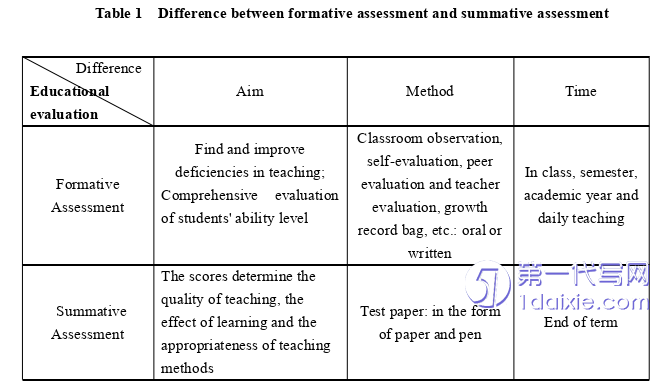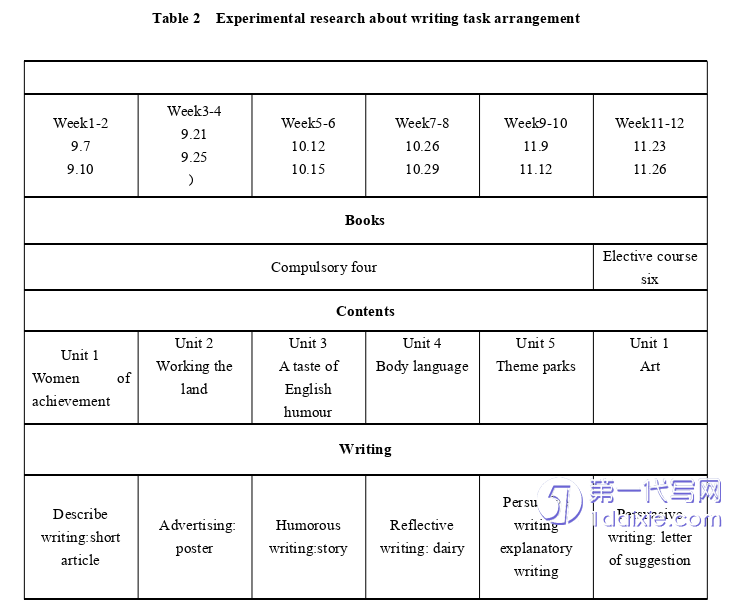本文是一篇英语论文,本文实践证明,形成性评价作为传统终结性评价的补充,在英语教学中发挥着重要作用,有利于提高学生的写作技能,近年来,形成性评价在英语课堂上的应用越来越广泛。
Chapter One Literature Review
1.1 Related concepts
In the setting of the new round of basic education curriculum reform,formativeevaluation has entered the public view to make up for the shortcomings of the traditionalsummative evaluation.Therefore,when the concept of formative evaluation is mentioned,itis closely related to summative evaluation.They have different concepts,time,advantagesand disadvantages,and should be used together and complement each other in teaching.
1.1.1 Formative assessment

“Formative evaluation”was first put forward by American evaluation expert Mr.Scriven in the book"methodology of evaluation"in 1967.It refers to the assessment of"thedevelopment of students'behaviour,achievement and emotional attitude in daily learning".It is a developmental assessment based on continuous observation,records and feedback onstudents'daily learning.The objective of formative assessment is to"stimulate students'learning,regulate students'learning process,make students believe in themselves and senseof achievement,and make students become the subject and participant of assessment"(LuoShaoxi,2003:14).In short,formative evaluation refers to the observation,recording andreflection in daily teaching activities in order to obtain more ideal results.In the process ofassessment,educators can find the problems existing in the activities,explore the directionof improvement,modify or adjust the plan in time,and achieve the teaching objectivesbetter.
1.2 Relevant research status abroad and at home
Taking the 1960s as the dividing line,educators and experts firstly think of summativeassessment before referring to"evaluation".After that,formative evaluation occupied astable position of summative assessment gradually.After the emergence of this concept,scholars at home and abroad have carried out a large number of theoretical and practicalresearch on it.The research results have affirmed the value of formative evaluation andmade it mature slowly.
1.2.1 Research status abroad
Foreign educational evaluation has a long history.Evaluation research began with thespelling test implemented by American educator rice on primary school students in 1897.Since then,it has gone through the development process of academic evaluation,educational evaluation and formative evaluation.In the 1950s,Tyler,the"father ofeducational evaluation",led the members of his investigation team to evaluate the results ofthe"eight-year study".One of the most important results of this evaluation is therecognition of the concept of replacing"test"with"educational evaluation".From 1960s tothe end of 1970s,educational evaluation developed rapidly.Scholars choose to study it from different aspects and put forward evaluation methods such as"target free evaluation".In1967,the concept of formative evaluation was first put forward by M.Scriven,a famousAmerican evaluation expert,in his book evaluation methodology.He believes that formativeevaluation can continuously improve the teaching activities of the curriculum and otherprogram activities.This kind of evaluation is different from the past and pays more attentionto the process,which should be advocated.In 1969,B.S.Bloom,an American evaluationexpert,applied formative evaluation to learning evaluation and found that formativeevaluation can provide immediate feedback to students at any stage of the teaching processto correct and make up for deficiencies.
Chapter Two Theoretical Foundation and Methodology
2.1 Theoretical foundation
Many theories in the field of psychology can effectively guide teaching and proposesuggestions on the application of formative assessment.For example,the theory of multipleintelligence suggests that we should esteem students'individual differences and teach themaccording to their aptitude in the process of applying formative assessment.The author'sresearch is based on constructivist theory,multiple intelligence theory on the impact offormative assessment about students'English writing in senior high school.
2.1.1 Constructivist theory
Constructivist theory is an important thought of cognitive psychology,which was putforward firstly by Swiss psychologist J.Piaget.Piaget believes that individual learningprocess is actually a process of construction.Learners interact with the environment andgradually construct their cognition of the world,so as to make the cognitive structuredevelop continuously.In the development of"individualism"and"D.katenberg's"initiative",Katz and others emphasize the significance of"Katz's"initiative".They emphasize thekey role of individual initiative and explore how to maximize individual initiative;Vogotsgyproposed the cultural and historical"theory which learners can determine the level anddegree of cognitive development,which is of great significance"(Fu Chunhui,2010:28).
2.2 Experimental design
From the 2003 English curriculum standards for senior high schools(experimentaldraft)to the 2017 English curriculum standards for senior high schools,"Formativeassessment"has always been an evaluation method advocated and used.In order to furtherexplore its impact on senior high school students'interest and ability in English writing,theauthor applies it to the English writing class of grade two of No.5 middle school inTongliao city.Put forward research hypotheses,choose a variety of research methods,andconduct a three-month teaching experiment.
2.2.1 Research questions
There are three research questions in this experiment:(1)What are the deficiencies offormative assessment at home and abroad?(2)How can formative evaluation be usedeffectively?(3)How to improve writing autonomy and English written expression ability?
2.2.2 Research subjects
The subjects of this study are 100 students from classes 6 and 12,grade 2,No.5middle school,Tongliao city,Inner Mongolia Autonomous Region.There are 50 students ineach class of the two classes,and the proportion of men and women is roughly the same(number of boys-number of girls≤5).In addition,these two classes are ordinary classes ingrade two of the school.The English level of the students in the two classes is the same,andthe writing scores are the same.
Chapter Three Results and Discussion........................54
3.1 Results.............................54
3.1.1 The obvious change for students'attitude towards English writing...................................54
3.1.2 The significant improvement for students'English writing autonomy...............................55
Conclusion.....................................61
Chapter Three Results and Discussion
3.1 Results
After the three-month teaching experiment,the students'performance has been verydifferent from that before the experiment.It is mainly reflected in the external attitude andinternal self perception.Students'attitude towards English writing,self-confidence inwriting and the quality of writing have changed greatly,which directly answers the fourresearch questions of the experiment,that is,after the application of formative assessment inEnglish Writing Teaching in senior high school,students'writing attitude has changed;Students'English writing autonomy has been improved;Students'self-confidence in writinghas been greatly enhanced;Students'English written expression ability is improved as awhole.
3.1.1 The obvious change for students'attitude towards English writing
The author found that after the application of formative assessment in the experimentalclass,students'writing attitude changed significantly,mainly because they no longer dislikewriting tasks.According to the results of the questionnaire,the original students are verydissatisfied with the writing questions set in the test paper and are not interested in Englishwriting.After applying formative assessment,students find the fun of writing in the processof English writing,and their attitude has changed.
In class,students regard thinking and argument as an interesting thing.Their writingviews are clear and logical.They can actively participate in group discussions and exchange views.After class,they will take the initiative to extract excellent materials,such assentences,vocabulary,lyrics,etc;Most students form the habit of keeping a diary in English,and some will take the initiative to practice English writing.English writing class is nolonger dull and tense,but warm and cheerful.Students have a high degree of classroomparticipation,frequent interaction between teachers,students and students,relaxed and freeclassroom dominated by teachers and students,more profound brainstorming on Englishwriting topics,and students'divergent thinking has been well exercised.

Conclusion
Main findings
Based on the question whether formative assessment can affect senior high schoolstudents'attitude,autonomy,self-confidence and overall ability,the author applies formativeassessment to the English writing classroom of two ordinary classes in senior two of No.5middle school in Tongliao City,Inner Mongolia Autonomous Region,and explores its rolein English writing teaching.It is found that formative assessment provides great help forEnglish Writing Teaching in senior high school.It can change the limitations of traditionalsummative evaluation,such as the singleness,and make up for the shortcomings oftraditional summative evaluation.
Firstly,the application of formative assessment enables students to:(1)personallyparticipate in the composition correction work,help each other with their peers,and learnfrom each other's strengths to make up for their weaknesses;(2)Know how to treat eachEnglish writing task correctly,change the traditional cognition and be interested in Englishwriting;(3)Enhance your confidence in writing;(4)Improve English writing autonomy;(5)Improve English written expression ability,etc.
Secondly,the application of formative assessment brings enlightenment to EnglishWriting Teaching:(1)pay attention to students'learning process in future teaching;(2)Payattention to the combination of multiple formative evaluation methods;(3)After theevaluation,teachers should reflect and adjust the teaching plan and teaching content in time.
reference(omitted)
